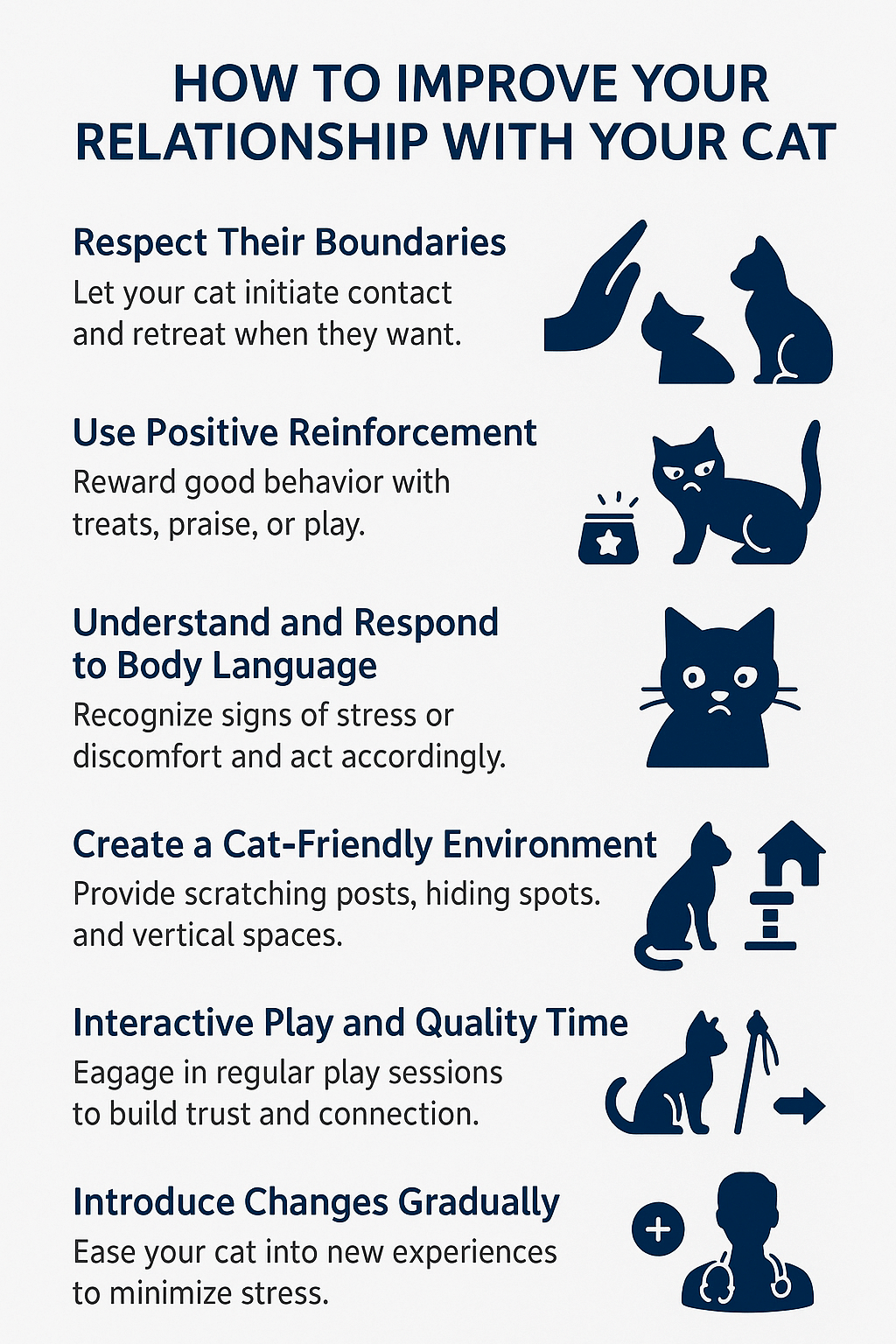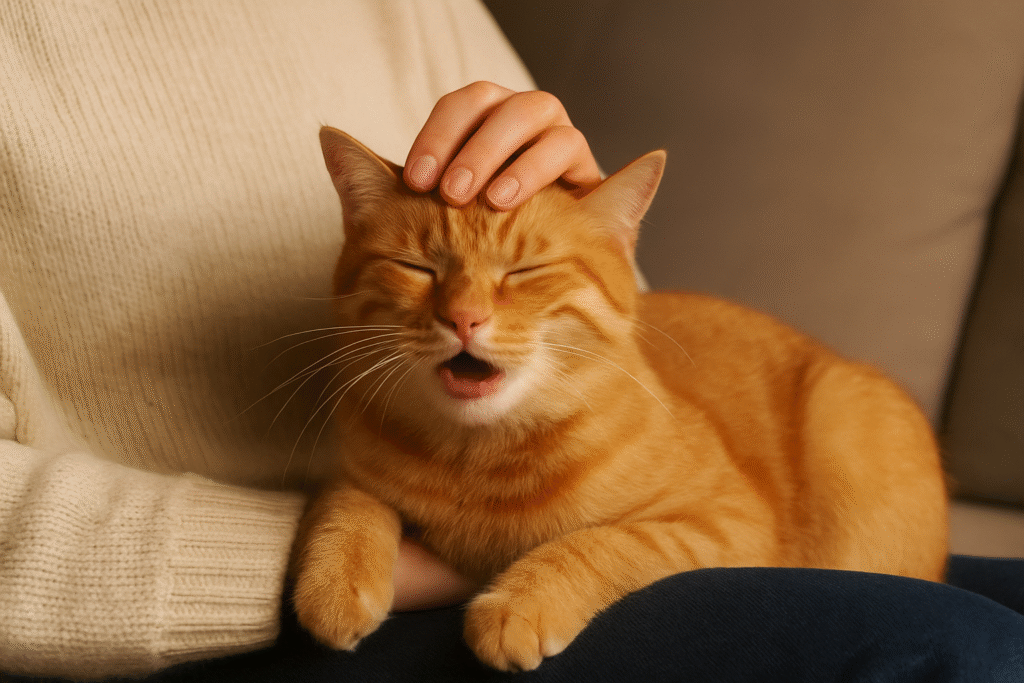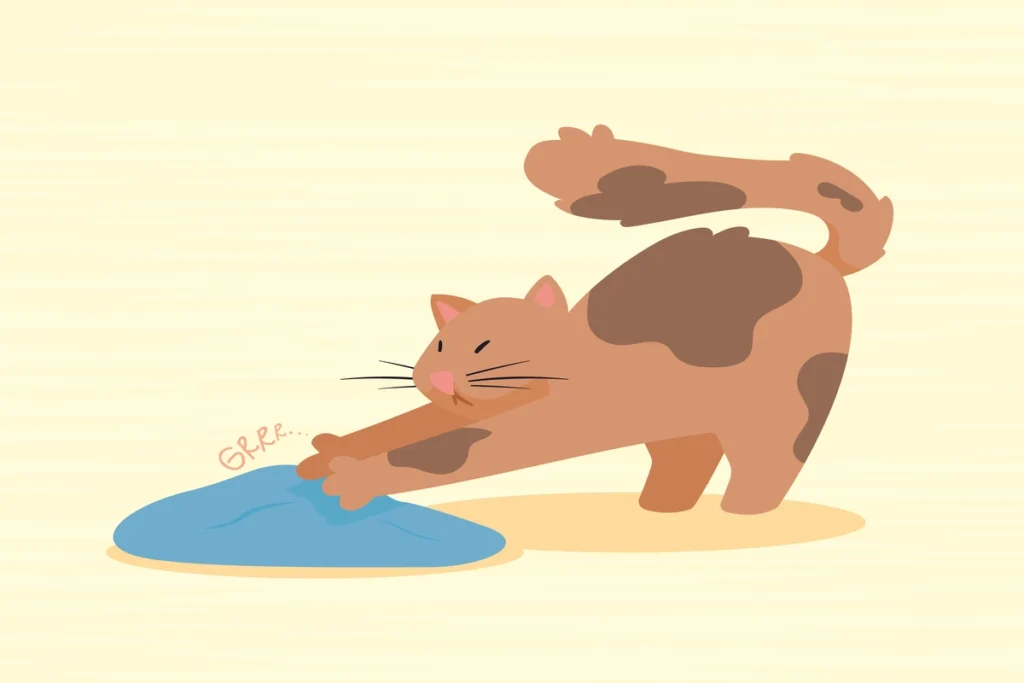Cats are mysterious, independent, and totally confusing. One moment, they are purring in your lap, and the next they’re not and might start ignoring you across the room. If you ever asked yourself, ‘Does my cat actually hate me?’ – you’re not alone.
While your cat probably doesn’t – and certainly not in the human sense – there are some signs that your cat may not be your number one fan.
Whether you’re dealing with bites, hiding, or death looks from the windowsill, it could be time to assess the signs and consider whether there’s a deeper issue at play.
In this blog post, we’ll explore:
- Common signs your cat may dislike you
- The possible reasons behind this behavior
- Helpful tips to rebuild trust and strengthen your bond
Do Cats Really Hate Their Owners?

Not really,
When we say cats hate, what we are more often really referring to is fear, anxiety, or a misunderstanding. They strictly act and react to stimuli based on instincts, and they communicate in a totally different manner than people.
They do not hold grudges in the same way we do, but they do possess memories of experiences, particularly negative ones.
You should reflect on how your interactions may have caused your cat not to want to be around you or to be disturbed by you.
Common Signs Your Cat May Dislike You

Avoidance or Hiding
If your cat disappears the moment you enter the room, you may have a cat that feels threatened or anxious. Cats that hide under beds or behind furniture may be trying to avoid your presence.
This is also a sign that they do not feel safe or relaxed around you. Outside stressors in the home or past experiences with humans may trigger this response.
Aggression (Biting, Scratching, Hissing)
Aggressive actions like Biting or hissing are a definite sign that you should back away.
These behaviors are often a result of fear, overstimulation or lack of trust. If your cat attacks during petting or if you approach to give affection or interaction, then there is a good chance they are uncomfortable.
Always take into account the situation and what was going on when the aggression happened to find out why the behavior took place.
Lack of Social Interaction
Pay attention to the signs if your cat does not want to sit next to you or jumps off the couch when you enter the room.
A friendly cat that suddenly decides to stay away from you is likely feeling hurt, scared, or annoyed by you. Emotional withdrawal may mean that a cat is uncomfortable, and in particular, with you. If so, consider if there is anything that has changed in your routine or environment.
Tail and Body Language
A cat can express many things through its tail and its posture.
For example, if your cat has a fluffed-up tail, an arched back, and its ears flattened out, your cat is subjectively fearful or acting aggressively. Even a low tail, with some flicking, indicates irritation.
The more you can understand them and read the sign, the more you can respect their space and diffuse the anxiety of conflict.
Refusing Food or Treats from You
A cat turning down food/treats from your hand means it doesn’t trust you. The cat might not like being close to you, but it might also relate you to something unpleasant in their space. This is when an owner will see the cat eat food only when they are not around, which highlights they have separation anxiety. You should slowly work on rebuilding trust by having positive experiences.
Staring or Watching From Afar
Cats naturally observe, but when they are staring from a distance without blinking an eye, that could symbolize something is off. If your cat is eagerly staring at you without engaging or has tension in their body, their fixated stare can mean they are suspicious.
As the silent watcher, your cat is observing from afar and is often unsure of what is happening. It is their way of watching and keeping themselves at a distance.
Why Your Cat Might Behave This Way

Lack of Socialization During Kittenhood
Cats that have not been handled thoughtfully or socialized with people earlier on can have a difficult time interacting with humans. The cat may view you more as a threat rather than a friend. Not enough bonding early on may mean that the cat will be skittish or avoidant.
It is hard to know how trusting the cat will be in the first instance, but continued deliberate, calm interaction with the cat can earn trust and reduce reactivity.
Changes in Environment or Routine
Cats are creatures of habit and not as adaptable to changes as many might presume. Even the smallest change, like moving a piece of furniture or changing the time of day they get fed, is enough to upset your cat and cause stress.
Major alterations, such as moving into a new house or introducing new pets into the house, will incite deep anxiety in your cat, leading to a complete change in their behavior as they try to cope.
Previous Trauma or Negative Associations
Cats with troubled histories may bring with them emotional scars to their new home. Abuse, neglect, or harsh environments can leave permanent impressions. The triggers that may prompt a strong reaction in these cats may relate to their history of trauma. These cats will require a slow, gentle approach to feel at ease again.
You’re Sending the Wrong Signals
Humans largely misread or overlook feline conversation. For example, loud voices, sudden movement, and uninvited hands are all overwhelming to a cat. Misunderstanding a cat’s comfort zone can cause fear reactions. When we stop and learn about their comfort zones and live within those feelings, we see the need expressed as change.
Health Issues
Changes in behavior can sometimes point to a medical issue. Pain, injury, or sickness can lead to irritability or withdrawal in a cat. Cats are often very good at hiding symptoms, and this unusual behavior can be the first signal. When you notice a shift in your cat’s behavior, the veterinarian has to be the first response.
How to Improve Your Relationship with Your Cat

Respect Their Boundaries
Cats are territorial animals and are sensitive to their space. Forcing hugs or constantly picking them up is stressful for them. Let them make contact, let them solicit closeness, and retreat when they need to. Respecting their cues will go a long way in gaining their trust.
Use Positive Reinforcement
Rewarding your cat for good behavior helps build positive associations with that behavior. Treating or giving them more playtime or gentle praise will work much better than scolding them. Often, punishment just instills fear and blocks your bond. It is better to keep the interaction calm, predictable, and rewarding.
Understand and Respond to Body Language
Cats offer so much without actual words. Flattened ears, swishing tails, or wide eyes signify discomfort, stress, or both. Understanding your cat’s body language helps you avoid unwanted interaction with your furry friend. When you designate that unwanted behavior, your response, if appropriate, sends a message of understanding. Building this understanding strengthens comfort and relationship with your cat.
Create a Cat-Friendly Environment
Your cat requires a safe and stimulating space that facilitates their growth and exploration. Provide vertical climbing surfaces, several cozy hiding areas, and scratching posts; plenty of natural light and windows can help your cat feel relaxed, too. A safe space that is designed well, reduces stress and is psychologically conducive to a confident feline.
Interactive Play and Quality Time
Engaging your cat in playtime every day will increase your bond. Wand toys, feather chasers, and even puzzle feeders all stimulate their instincts. You are contributing toward their overall exercise and mental exercise with playtime. Fun with you creates a playful context in which your cat may see you as a bonded or trusted companion.
Introduce Changes Gradually
Changes can create stress for your cat. Whether it is new furniture, a new schedule, or new people and pets, you can help to ease these changes slowly. Allow your cat to adjust and explore their new surroundings on their terms. Slowly easing into new changes will result in less anxiety and resistance for your cat.
Seek Professional Help
If your cat doesn’t start acting differently, it may be time to reach out to an expert. A vet can rule out any medical reasons behind your cat’s behavior, while a behaviorist can provide unique techniques tailored to you and your cat. If your cat is constantly stressed or aggressive, you may need extra support. A professional can help make sure your cat receives the necessary help.
When to Be Concerned About Your Cat’s Behavior
If your cat’s behavior becomes suddenly drastic, like extreme (constant hiding, unprovoked aggression, or total withdrawal), do not ignore it. These changes in behavior may be indicating illness, anxiety, or trauma that requires immediate intervention.
Any behaviors that are consistent and affect either the quality of life of the cat or your relationship with the cat should be evaluated by a professional. Early intervention can often lead to better outcomes for both you and your cat.
FAQs
Why does my cat hide from me?
Hiding is typically a sign of stress or fear. If your cat runs away every time you come near, they may be feeling unsafe for some reason. It could be a variety of factors, such as environmental changes, some sort of negative experience, or discomfort relating to their health. If you can create a safe and predictable environment, it may help reduce their anxiety.
Can I make my cat like me again?
Yes, but you must be patient and work into it. Begin to create positive associations with the pet using treats, soft play, and respect for their space. Do not work to force interactions and allow the pet to come to you. Being consistent and nice will go a long way to rebuild that trust.
How can I tell if my cat is stressed or unwell?
Signs of stress or illness include changes in eating habits, excessive grooming, aggression or hiding. If your cat appears to be different from their normal self, you should definitely have it checked out by a vet. Many health conditions can show similar characteristics to behavioral problems, so it is always useful to have the animal professionally checked.
Is my cat’s behavior normal?
Every cat has their own personality, but significant or sudden behavioral changes are significant to pay attention to. When a cat becomes withdrawn, angry or excessively fearful, it’s something to pay close attention to. Knowing your cat’s baseline behaviors will give you the best chance to catch concerning changes early.
Conclusion
Your cat likely does not hate you; they just do not speak your language. Take the time to learn theirs. Give them room to grow, respect their boundaries and let trust develop. A deeper relationship with one of the most complicated and interesting creatures you may have ever shared your home with.
Remember, cats are not emotionally cold; they are emotionally careful. With time, attention, and consistency, even the most distant feline can learn to trust and develop a relationship with you. In the end, patience will reward you with love and understanding from your cat.





